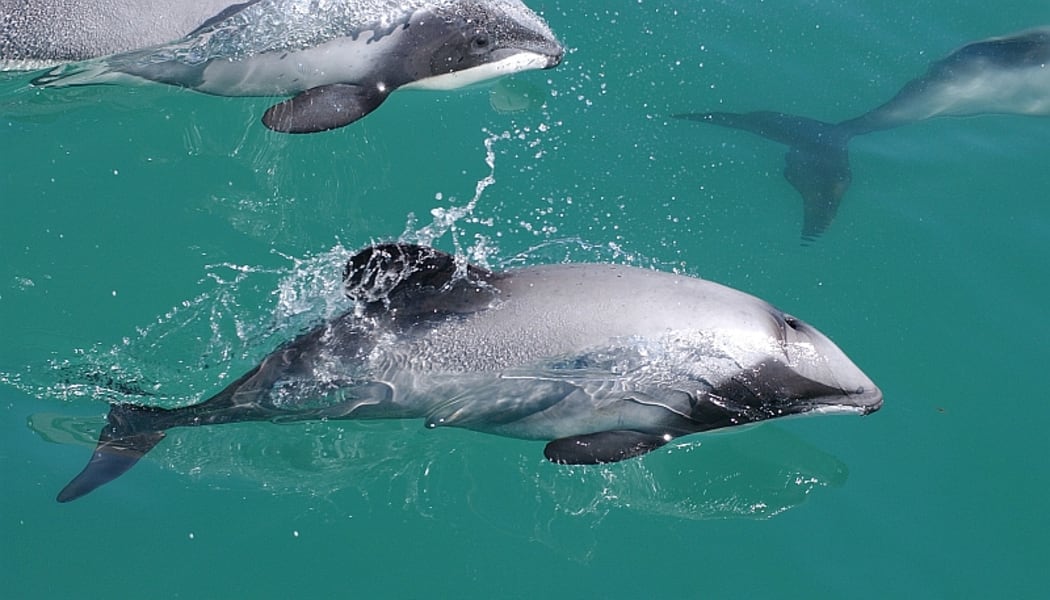The United States is calling for further protection for Māui and Hector's dolphins, a move a local zoologist describes as embarrassing for the New Zealand government.

Endangered Māui's dolphins are threatened by certain types of fishing. Photo: Earthrace Conservation/Liz Slooten (CC BY-NC-SA 2.0)
The US National Marine Fisheries Service (NMFS) wants to add the dolphins to the country's Endangered Species Act.
The Māui dolphin will be listed as 'endangered' under the Act, while the South Island Hector's dolphin will be added as a threatened species.
Both are subspecies of the Hector's dolphin and occur only in New Zealand.
The NMFS has no jurisdiction in New Zealand, but it said listing the two breeds under the Act could help to promote their conservation.
Otago University zoologist Liz Slooten said it was embarrassing for the government that the United States was calling for further protection for the dolphins.
Dr Slooten agreed it would shine a light on the plight of the dolphins internationally and could spur the government into action.
Putting extra protections in place for Māui and Hector's dolphins would be straightforward, she said.
"All we need to do is to stop two fishing methods - gill nets and trawling - from happening inside the habitat of these dolphins.
"Nobody's saying, 'You should stop fishing' or, 'You should stop fishing in dolphin habitat', they're simply saying, 'Will you please use dolphin-safe fishing methods'."
The chair of the conservation group Maui and Hector's Dolphin Defenders, Christine Rose said the agency's report confirmed what is already known about the dolphins' precarious situation.
"We're real outliers on this issue internationally. When it comes up to the International Whaling Commission and New Zealand is the only country that votes against having these dolphins recognised as really critically at risk, it means that we're out of step."
Ms Rose said the government was in denial about its responsibility and she doubted any action would be taken.
The US Marine Fisheries Service proposal comes hot on the heels of another major fisheries decision.
Countries exporting fish to the US must bring their fisheries systems up to its standard within five years, which Dr Slooten said was achievable for New Zealand.
Minister of Conservation Maggie Barry was unavailable for comment.
Hector's dolphin endemic to New Zealand
The Hector's dolphin is one of the world's smallest dolphins and occurs only in the coastal waters of New Zealand.
Maui's dolphins are found along the northwest coast of the North Island, between Maunganui Bluff in the north and Whanganui in the south, although they have occasionally been seen further south along the west coast as well as in Hawke's Bay.
South Island Hector's dolphins are most abundant around Banks Peninsula, Cloudy Bay, and Clifford's Bay on the east coast, and along the central west coast.
The NMFS proposal states that Maui's dolphin has critically low numbers, a restricted range and faces ongoing threats as bycatch in commercial and recreational gill nets.
It also said it had a low population growth rate and low genetic diversity.
The NMFS said while the South Island Hector's Dolphin was not currently in danger of extinction, that was likely to happen in the foreseeable future.
The Hector's dolphin, which had experienced large historical declines, was expected to keep slowly declining "due to bycatch and other lesser threats, such as disease and impacts associated with tourism".
"There is some evidence that commercial dolphin-watching vessels and swim-with-dolphin operations cause behavioural changes in Hector's dolphins," the agency said.
However, the NMFS discounted a 2012 study that claimed tourism-related "boat strikes, noise, and displacement" posed threats for the dolphins.
Threats to the habitat of Maui's dolphins included pollution, oil and gas mining and acoustic disturbance, the agency noted.
It referred to a 2012 study that identified plastics as being likely to affect Maui's dolphins.
"Plastic bags have been identified as a concern in particular, because they may be mistaken for squid, a common prey item for Maui's dolphins."

